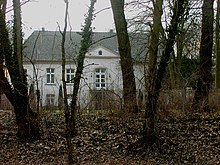Carl von Schlotheim
Baron Carl Ludwig Theodor von Schlotheim (* April 2, 1796 ; † May 14, 1869 in Bad Oeynhausen or Wietersheim ?) Was a German government official and member of parliament. From 1849 to 1869 he was district administrator of the Prussian district of Minden in Westphalia .
Life
Carl von Schlotheim was born in 1796 as the son of a family from Thuringian nobility; the family's status as a baron was confirmed by the Prussian king in 1844. Schlotheim was the son of the Hessian officer and later general Ernst Wilhelm von Schlotheim (1764-1845) and his wife Charlotte Sophie Sabine Dorothea von Lehsten (1772-1840). In his youth he was a page at the Kassel court of Jérôme Bonaparte , King of Westphalia (1807-1813).
Carl von Schlotheim became an officer, took his leave as a major and became a bailiff at Wietersheim Castle , which he owned in 1820 through his marriage. From 1837 he was a member of the district council of the Minden district. During his time as bailiff he promoted the expansion of the dikes along the Weser ; this measure gave a large number of people jobs.
On March 14, 1849, Schlotheim was entrusted with the administration of the district office in the Minden district and on November 30, 1850 was finally appointed district administrator. During his tenure, with a state grant of 15,000 thalers, numerous dykes were built along the Weser in the area of today's city of Petershagen , most of which still have their function in flood protection. Carl von Schlotheim is considered the "road builder" of the Minden district.
On November 26, 1853, the district council unanimously approved the Promemoria memorandum presented by Carl von Schlotheim as a program for the development of the Minden district. In this memorandum, he proposed that the 135 kilometers of roads in the district should be expanded in an extensive program by around 2000 unemployed day laborers . This program turned out to be an exemplary job creation measure in the following years, which helped the district to an economic upswing. The program gave the day labor families an economic perspective and relieved the communities of caring for the poor. The economic need was very great in the middle of the 19th century: for example, the Petershagen office had to spend 1565 thalers in 1859 and 1861 for poor relief.
Carl von Schlotheim was a member of the Prussian House of Representatives .
family
Carl von Schlotheim was a Protestant and had been married since November 15, 1820. His wife Félicité-Mélanie Adélaïde b. Lagarde (* 1803 in Nantes ; † 1876) was a biological daughter of Jérôme Bonaparte , who raised her to Countess of Wietersheim in 1810. Schlotheim married her on November 15, 1820 in Trieste , where Jérôme Bonaparte was living in exile . The couple had four children:
- Eduard * Ernst Franz Johann von Schlotheim became a pastor
- Charlotte * Luitgarde Ernestine Melanie von Schlotheim
- Mathilde * Auguste Charlotte Henriette Emilie von Schlotheim, married Wilhelm von der Horst in 1853, former Prussian lieutenant colonel. D.
- Emilie * Jeromia Melanie von Schlotheim, married Oskar Meding (1828–1903), councilor and writer in 1854
Awards
Carl von Schlotheim was a Prussian chamberlain, holder of the Red Eagle Order IV class and the Ernst August Order 1st class and legal knight of the Order of St. John .
literature
- Wilhelm Brepohl : In memoriam District Administrator Freiherr von Schlotheim . In: Mindener Heimatblätter. Vol. 29, 1957, pp. 102-105
- Wilhelm Brepohl: The "Countess of Wietersheim". A daughter of Jerome Napoleon. In: Mindener Heimatblätter. Vol. 27, 1955, ZDB -ID 551392-3 , pp. 68–77 (June / July) and 89–105 (August)
Individual evidence
- ^ Weekly newspaper of the Johanniter-Ordens-Balley Brandenburg 10 (1869), p. 187
Web links
- Short biography in the project Westphalian history
- "Schlotheim, Carl Ludwig Theodor Freiherr von". Hessian biography. In: Landesgeschichtliches Informationssystem Hessen (LAGIS).
| predecessor | Office | successor |
|---|---|---|
| Ernst Wilhelm Georg Heinrich von Korff zu Waghorst |
District Administrator of the Minden District 1849 - 1869 |
Alexander von Oheimb |
| personal data | |
|---|---|
| SURNAME | Schlotheim, Carl von |
| ALTERNATIVE NAMES | Schlotheim, Carl Ludwig Theodor Freiherr von (full name) |
| BRIEF DESCRIPTION | German government official, member of parliament |
| DATE OF BIRTH | April 2, 1796 |
| DATE OF DEATH | May 14, 1869 |
| Place of death | Oeynhausen or Wietersheim |

